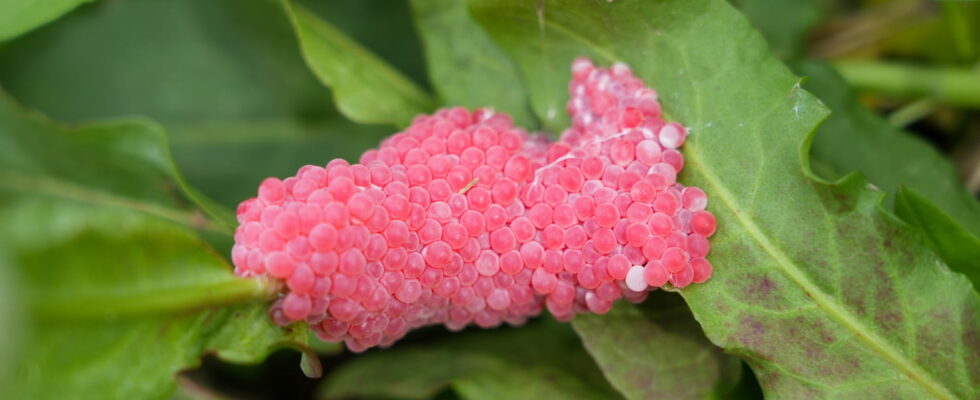These little pink eggs have been seen in France and they are a real threat. Those who see them must act quickly.
There are many pests in the garden. While some, such as slugs and aphids, are known to all gardeners, others are less so, if at all, and can nevertheless cause great damage. This is the case with these little pink eggs that arrive in the gardens. At first glance, they may seem innocuous, but they should immediately catch your attention.
These pink eggs are laid by an invasive species: Pomacea canaliculata, better known as the aquatic potato or apple snail. This species has been banned from introduction and propagation in France, but also throughout the European Union since 2012. It represents a real danger for the environment, ecosystems, and even public health.
However, we find more and more of them in Europe. The species was first spotted in France in July 2018. These small snails were first imported by people with an aquarium. It is a species that actually lives in fresh water, but which can also live and breathe on land, and therefore invade and devour your plantations.
Due to its great capacity for adaptation, Pomacea canaliculata quickly spread in environments where it has no natural predators. Its eggs, bright pink in color, are laid on the surface of aquatic plants, artificial structures like bridges and even on garden walls in wet areas. This mollusk can lay thousands of eggs during its life, making its proliferation exponential and therefore particularly difficult to control.
Apple snails are particularly voracious and cause havoc in the aquatic ecosystems where they establish themselves. By destroying aquatic vegetation, these snails disrupt natural habitats, which can cause harmful algae blooms. These algae, in addition to depleting the water in oxygen, can produce toxins dangerous to fish, other aquatic animals, and even humans who approach these contaminated bodies of water.
In domestic gardens, snails can destroy your aquatic plants, affect the quality of your ponds, but also eat all the surrounding plants, and endanger your plantations. Although this snail usually prefers humid environments such as ponds, ponds or basins, it also lives on land. Its numerous pink eggs can quickly become a scourge if measures are not taken.
Beyond the ecological impact, these snails can also represent a danger to human health. Indeed, these molluscs carry parasites, notably the liver fluke worm and parasites capable of causing eosinophilic meningitis in humans.
If you discover these eggs, you should report them to the relevant environmental authorities near you. The eggs will then be examined in the laboratory to rule out any confusion with harmless native species.
